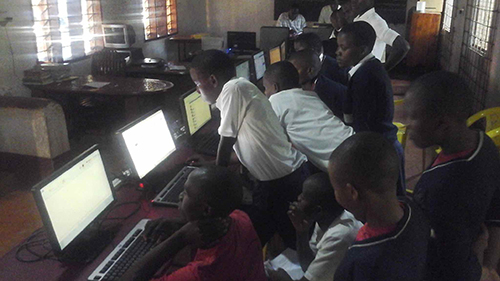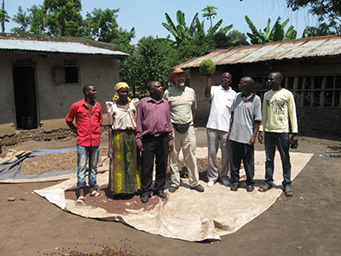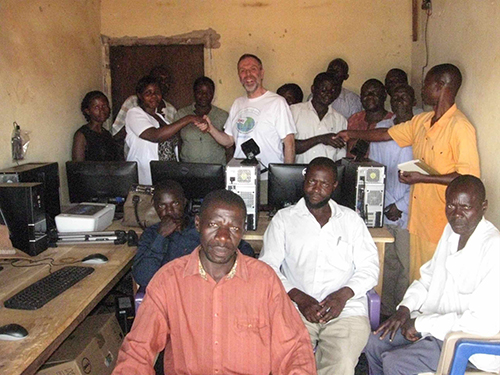Aussie telco Pivotel boosts Uganda’s internet for healthcare and education
AUSTRALIAN satellite telecommunications provider Pivotel has partnered with humanitarian group Internet for Humanity to provide communication hardware and 2G internet access to remote communities in Uganda.
With a population of 41 million people – but only 5 million having internet access – the partnership in Uganda aims to increase internet connectivity for those living in poor communities, helping improve frontline services including healthcare and education. 
Pivotel executive director Robert Sakker said while the focus in Australia was on faster communications like 4G LTE and high speed NBN, millions of people in countries like Uganda have no access to a computer to gain knowledge or communicate with others, or even know how to send an email.
“We are committing over $13,000 of hardware and more again in ongoing services in the first phase of our partnership, which continues a 10-year relationship already valued at over $130,000, thanks to our newly acquired satellite data business, Global Marine Networks (GMN),” Mr Sakker said.
“The Internet for Humanity partnership is GMN’s longest running corporate social responsibility partner, and we are proud to continue the legacy that has already helped tens of thousands of students, families, teachers, doctors, nurses and farmers to improve their knowledge and their livelihood in Uganda.”
Through its subsidiary GMN, Pivotel will initially provide 20 Redport Optimizer Premier units and ongoing services to help Internet for Humanity achieve its goal of establishing 18 new Information Technology Centres across healthcare, education and agriculture in Uganda.
“The Redport Optimizer Premier units compress the transfer of data for everyday internet applications like email, web, Skype and more,” Mr Sakker said.
“The compression technology reduces data such as images and banner ads by up to 80 percent, meaning significant cost savings for end users. We are also looking into expanding our impact in Uganda by providing satellite data connectivity where there is no internet access,” he said.
Robert Tabula, a former school teacher at the first school in Uganda where Internet for Humanity installed a compressed-internet computer network, and now full-time Internet for Humanity Uganda representative, installer and mentor, said Western countries took high speed internet for granted.
“When we set up a computer in a new school or community health clinic, we have many people who think it’s a television,” Mr Tabula said. “It takes a lot of time to teach people how to use email and the internet, but when they grasp the concept, they flourish.”
Mr Tabula started his career as a biology and chemistry teacher, but when he had access to the communication technology in the school he teaches at, installed by Internet for Humanity, his passion for information technology (IT) developed quickly.
Mr Tabula went on to gain a bachelor degree in IT and volunteered to introduce the internet and email into the students’ curriculum.
Students who have had exposure to email and internet through this program have gone on to university studies and earn enough income to support themselves and their families.
“Until now, teachers have been using their own textbooks from five or 10 years ago and teaching that outdated information to the students,” Mr Tabula said.
“Now, we are seeing teachers and students using the internet to get up to the minute information and email other schools sharing knowledge and creating a community.
Mr Tabula said it was not just teachers and students benefitting from the internet access. 
“While the internet may be a source of entertainment in Australia, it’s a source of knowledge and a tool for doing business for so many communities in Uganda. For example, in 2013 a farmer co-op of more than 8000 people noticed a disease attacking its banana plantation,” Mr Tabula said.
“They had no idea what it was, what caused it, or what would fix it until they used the internet provided by Internet for Humanity and GMN to research it. The knowledge they gained from the internet meant they could treat it immediately and as a result, they saved their crop and could earn their income.”
Mr Sakker said the success stories were the reasons behind Pivotel committing to the charity.
“It’s stories like these that make us proud to partner with such an important not for profit, making a real difference using a form of technology we work with every day,” he said.
“By providing the internet to these communities, we’re providing a chance to improve knowledge and skills, and a chance to drive the economy.”
In Australia, Pivotel Group’s 4G mobile network, marketed as ecosphere, extends its carrier network to deliver complementary terrestrial wireless services to rural and remote communities and the company is one of the leading providers of satellite and mobile technology.
Internet for Humanity, formerly known as REMCU has for the past 11 years established and supported reliable low-cost internet browsing and email systems in isolated and impoverished regions of the world. The not-for-profit installs, supports, and trains local administrators to effectively utilise the technology. 
ends

